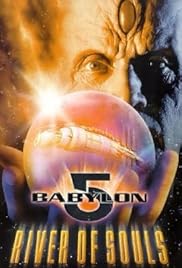 As you get older and, in theory, better it is a good exercise to re-read and re-watch things you thought were great in your youth. You really are watching them with “different eyes.” What once was great will may seem stupid now. Occasionally, you will be shocked by just how great something really was in ways you didn’t realize.
As you get older and, in theory, better it is a good exercise to re-read and re-watch things you thought were great in your youth. You really are watching them with “different eyes.” What once was great will may seem stupid now. Occasionally, you will be shocked by just how great something really was in ways you didn’t realize.
I’ve been nightly binging my way through the “Babylon 5” series, “The Lost Episodes” and finally the TNT movies. One in particular from the movies really struck me, “The River of Souls.” Those who recognize voices might well recognize Martin Sheen as the Soul Hunter. You have to be really good with voices though because the makeup department did their best to hide him.
Both science and literary fiction have been exploring the concept of eternal life. Some explore from the scientific or mechanical extension of life while others explore the social and moral dilemmas associated with never dying. Even Greek Mythology explored this with Tithonus.
She then asked Zeus to grant Tithonus immortality, but did not think of asking to grant him eternal youth too. As a result, Tithonus aged and did not die, resulting in his strength wilting away to the point that he could no longer move his arms. All he could do was babble continuously; in the end, he turned into a cicada, hoping that death would come for him as well.
Almost all of you will have heard of “Dante’s Inferno” and its 9 circles of Hell. Clear back in the 14th century humans were trying to define Hell. Many of you will be able to point to written examples of humans defining Hell outside of religious context which are even earlier.
Each culture, perhaps even each generation, comes up with newer personal definitions of Hell which resonate. Writers exploring only the good cannot do it justice without providing some exploration of the bad. It should come as little surprise that FOX has been exploring the good side of the bad with it’s show “Lucifer.”
All of this brings us back to “The River of Souls.” You do not have to be a fan of the series or have even watched a single episode to enjoy and relish in the greatness of this made for TV movie. The writing is both subtle and astounding. I can’t find the exchange between Captain Lochley and the Soul Hunter on any of the usual quote sites. Perhaps because it is deep rather than pithy.
For the unenlightened, Soul Hunters are a species drawn to death. They sense its approach from light years away and come to claim the soul at the moment of death. Not all souls, only those they feel are truly great. Philosophers, poets, musicians, etc. Those who move a culture forward in exploration of itself. Yes, even a token few statesmen, just none from Earth.
They have these little roundish orbs which very in size from one to just over a billion soul capacity. The orbs are then placed in these deep underground temple like storage areas. I found the script in a not good format here. I’ve prettied up the section I’m talking about for you here:
Soul Hunter: We have little contact with others. In fact, we rarely speak to anyone… …except, of course, those we are called upon to save.
Lochley: And what happens to them after you’ve saved them?
Soul Hunter: Oh, they are placed in the great halls, which have been provided for that purpose.
Lochley: And then what?
Soul Hunter: And then… …what, what?
Lochley: Okay. Okay, putting aside for the moment the question about… …just what it is you’re taking, the memory or the soul… …let’s say you take the essence of a great concert pianist… …and you put him in one of these great halls… …then what happens?
Soul Hunter: We preserve him against the ages. We continue him.
Lochley: And that’s it? He has no further contact with anyone?
Soul Hunter: Oh, sometimes we talk with the souls, and they will talk with each other.
Lochley: I see. Well, Mr. Garibaldi’s feelings about heaven notwithstanding… …I think you’ve just described hell as well as anything I’ve ever heard.
Soul Hunter: You don’t understand because you are trapped… …in a prison of your own flesh. The flesh has desires. The flesh has needs. But the soul is pure. The soul needs only to continue. – To be.
Lochley: – Maybe. And maybe for some souls, it’s not enough just being. It’s the doing that makes us what we are. If these souls were valuable… …it’s because of what they did or the way they saw the world. What you describe is an existence without the possibility of any change. Unable to touch the world or affect it. Unable to express the slightest creative impulse. Unable to touch or be touched in return. If Mr. Garibaldi’s wrong and there is a heaven… …you’re committing a crime beyond description by taking these souls… …instead of allowing them to move on.
Soul Hunter: But if he and we are correct, and there is nothing beyond… …wouldn’t you want to be continued?
Lochley: No. No, not like that. Not…
As a writer it is your obligation to have these conversations in your mind and in your work. Don’t just tell or force your own personal opinion on the reader. You will have sacrificed a great portion of your potential market because, believe it or not, many people will not share your opinion. Arguing it out as was done here, in service of the plot and story letting one character hold your view while others disagree is great writing.
It should come as little surprise that this story reveals roughly half of the billion or so souls in said container went insane. Unable to cope with an existence where they could only exchange thoughts with others, without any hope of sharing a meal or feeling the warmth of a hug. Trapped for thousands of years in the orb/vessel even the currently sane ones admitted they would all fall.
Today we live in a world where hacking out a fast and dirty “solution” via an invalid methodology known as AGILE is all the rush. Bang a buggy piece of shit out the door and book it as an asset in violation of the spirit of SOX. These orbs and this movie are about so many things, but the biggest, most important one is the magnitude of the problems a short term hack intended to solve one “story” without any in-depth analysis of its implication leads to crimes against humanity. Nobody considered Lochley’s question:
And then what?
The short term hack with automated testing “solved the story” but did not solve the problem. Yes, they created a method of capturing the essence of a person at the moment of death, but they didn’t solve the whole problem. They created a form of solitary confinement where a person never needed to be fed or thought of again. They could not “expire” within the container because they had no physical attributes. They took the best and the brightest then put them in a prison where the living would not have put the worst of the worst.


Ah, good article. But Roland, I wanted my morning. I didn’t want to think, and now you’ve screwed the whole thing up!